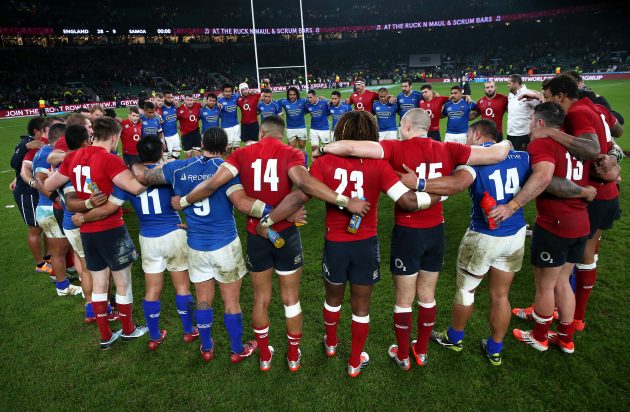While the Samoan players are forced to seek public support with such meagre resources, there maybe a much bigger crisis on the horizon
By Ed King
As we approach what has been a controversial lead-up to Saturday’s game against Samoa, England’s players, after much thought, declined the suggestion to donate a lump sum to Samoa’s players after its rugby union declared itself bankrupt, despite strongly refuted claims from World Rugby.
There has been an increasing groundswell of support for the Pacific Islanders, which typifies rugby’s strong community spirit and a tacit acknowledgement of the joy and soul Samoan players bring to the game.
For now World Rugby’s focus is on the Samoan Rugby Union, and to what extent it can ensure that its players are better protected and better paid to provide them with a sustainable future.
But rugby fans will not know the islanders face a deeper existential threat. I spent last week reporting from the 2017 UN climate change summit, hosted by another great rugby power, Fiji.

Under threat: Wales played in Apia in the summer but its islands are under threat from climate change
The two-week conference is being hosted in Bonn, Germany, as Suva is too small to cope with 25,000 delegates, but the event had an unmistakably ebullient Fijian spirit.
Amid the joy there is also fear. The country’s rugby-mad prime minister Frank Bainimarama describes the threat of global warming as “life or death” for his country.
“We are all in the same canoe,” Bainimarama – broad as an old-school prop – told the meeting as it opened in Monday.
Harsh projections
The UN’s latest climate science study underpins the fear that rugby’s three Pacific island powers are in the firing line.
It says sea levels are rising as a result of melting glaciers in the Arctic, and predicts “severe sea flood and erosion risks for low-lying coastal areas and atoll islands”.
Rising ocean temperatures are killing off some coral reefs – which as well as looking nice for scuba divers also provide homes for multiple forms of sea life.
Rising surface temperatures are making incidences of malaria and dengue fever more common in Samoa and Tonga.

Battling it out: Scotland played in Fiji’s capital Suva in the summer
The UN also warns of “increased stress and declining well-being that comes with property damage, loss of economic livelihood, and threatened communities.”
In Bonn, 25-year-old Fijian climate campaigner Lagi Seru told me rising seas are now washing away villages on the north cost of the main island, and in a slightly grimmer twist, cemeteries too.
“It’s not just the living that are affected, it’s the dead too,” he said.
In addition to the slow rise of the seas, scientists reckon major blowouts like Tropical Cyclone Winston in 2016 may become more severe.
An estimated 350,000 Fijians – half the population – were affected by that storm. Half of Tonga’s crops were damaged, with an estimated 80-90% of banana plantations knocked over.
Rugby’s challenge
In the short term the implications of climate change mean Pacific governments will need to invest more in bigger sea walls, storm shelters and protect freshwater sources.

Physical battle: Courtney Lawes runs into a blue wall of Samoans
In the long term some governments are already preparing for the worst, negotiating climate migration visas with Australia, New Zealand and even the USA.
If the scientific projections are accurate, the implications for rugby appear clear: three of its proudest nations face a challenge far deeper and more profound than bankruptcy.
When a nation’s way of life is under threat, what time is left for sport?
Yet if the response from England’s players is heartwarming – the wider response from the RFU and World Rugby needs more support given the stresses these nations are tackling.
Faced with an existential challenge, World Rugby talks of encouraging more tier-one nations to visit the Pacific.

Blood brothers: Billy and Mako Vunipola hail from Tonga
Meanwhile the RFU – which boasts the likes of Mako Vunipola, Billy Vunipola, Nathan Hughes and Denny Solomona and Semesa Rokoduguni hailing from the islands – despite pledging £75,000 from the gate receipts on Saturday, seems less willing to agree an equitable revenue sharing deal that could be invested into the Pacific region.
According to Dan Leo, head of the Pacific Rugby Players’ Welfare association, around 500 Pacific players now ply their trade in the UK alone.
England’s quota of Islanders has risen sharply since Tongan winger Lesley Vainikolo became the first Polynesian to wear the red Rose in 2008.

Flying Fijian: Tevita Kuridrani is another player to hail from the Pacific Islands
This weekend 23 players with Pacific heritage will play for tier-one countries, among them Wales’ Taulupe Faletau (Tonga), Ireland’s Bundee Aki (Samoa) and Australia’s Tevita Kuridrani (Fiji).
More are likely to follow, predicts Kya Lal, a Fiji-based lawyer and academic who has studied the rise in climate-linked migration.
A massive rugby fan – she fears that Fiji’s epic 2016 Olympic Sevens win could be an anomaly if the flow of players away from the islands continues to increase.
“It’s amazing what we have been able to achieve given the lack of resources, but there’s reason to believe these will be more strained as a result of climate change,” she says.
“The impacts are only going to get worse, and if more players emigrate that will hamper our ability to compete.”
They may be Pacific Warriors. But they also need our help.
Ed King is a freelance environmental writer based in London. He was founding editor of Climate Home News, and is a consultant for the European Climate Foundation.





